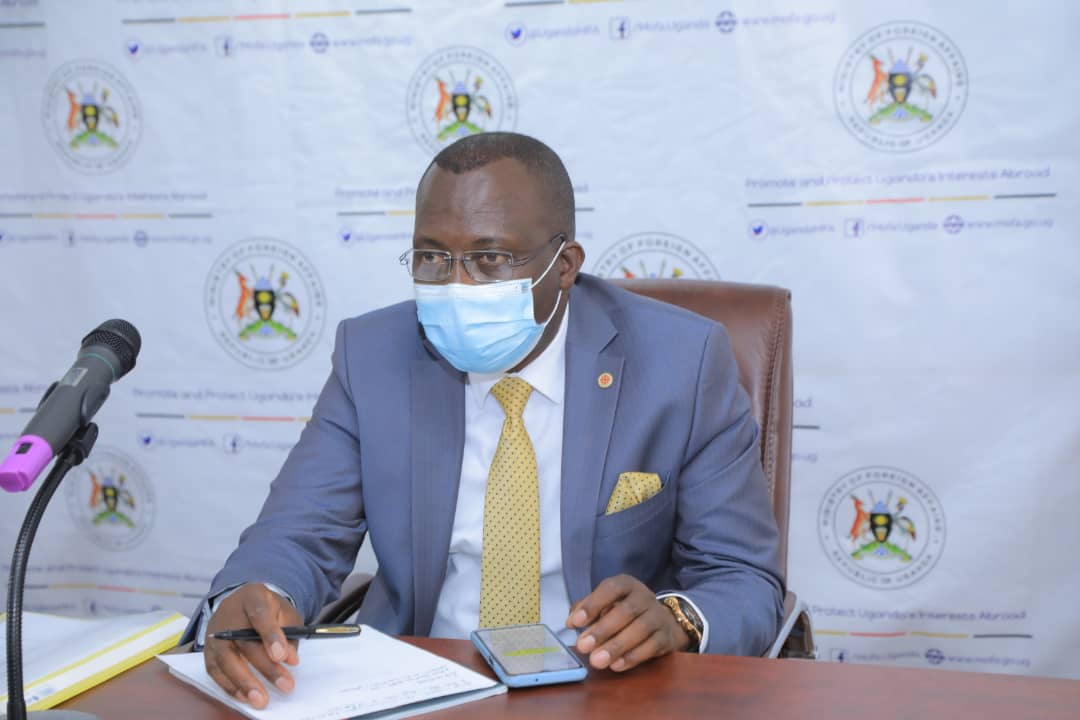The U.S government is meeting all the necessary costs for the stay of Afghan evacuees already in Uganda and those yet to arrive, according to government of Uganda.
Uganda on Wednesday received the 51 Afghan evacuees who are part of the 2,000 the country intends to temporarily host as requested by the United States of America.
Many Ugandans have since the announcement of Uganda’s readiness to host the fleeing evacuees from Afghanistan, questioned where their facilitation and upkeep would come from.
But on Thursday while addressing journalists at the Foreign Affairs Ministry, the Minister of State in Charge of Regional Affairs, John Mulimba said all the costs are met by the U.S government.
“We were asked by the U.S government to host these evacuees who are only here temporarily such that arrangements are made for them to proceed to the final destination. We are hosting them here on behalf of the U.S government for purposes of screening them. Uganda is not responsible for the bills, government of the U.S is footing all of them,” Mulimba said.
The Minister had earlier on Wednesday reiterated the same in Parliament when he said that: “The evacuees will remain in Uganda while they are processed by the US Embassy, for their onward journey. It is worth noting that these are not refugees. The processing may take a few weeks or month.”
During his address today, Mulimba also dismissed claims that only Uganda had allowed in Afghan evacuees, saying 60 countries globally expressed readiness to the effect.
“When this call was made, 60-member countries of the United Nations agreed to the cause of hosting evacuees from Afghanistan, Uganda is one of them. So it is not true that it is only Uganda which was chosen, because we expect more that one million people to leave Afghanistan and not all of them are coming to Uganda,” says Mulimba.
On how Uganda intends to benefit from hosting the evacuees, the Minister said Uganda is only acting on humanitarian grounds and expects no benefits in return.
“Hosting a person who is fleeing from his or her country for purposes of asylum is a humanitarian issue. When you are acting on humanitarian grounds, you don’t expect a benefit. If I make an alarm that someone has attacked me, do you first ask what I am going to give you before extending help? If yes, then that is not humanitarian,” Mulimba noted.
“On humanitarian grounds, all of us who are signatories to the United Nations Convention on refugees and persons who are stateless of 1951, are obliged to give home to the homeless and those looking for asylum. And so, Uganda acted in accordance with that protocol,” he added.
Asked when the next and second batch of Afghan evacuees will arrive in the country, Mulimba said: “We can not confirm, we shall keep expecting. We can’t confirm the time but any time they will be here. You know very well that this is a very volatile situation and some of them are coming aboard chartered planes and others using U.S provided planes but the nation will be kept up to speed as events unfold.”
Uganda currently hosts 1,498,442 refugees and asylum seekers mostly from South Sudan, DR Congo, Burundi, Somalia and Rwanda.
The country’s open door policy for refugees is hailed by the United Nations (UN) as the most progressive in the world.
Ugandans Stranded in Afghanistan
The Minister also commented on calls by different individuals to government to as well swiftly evacuate Ugandan nationals said to be stranded in Afghanistan.
He said as of Thursday, Government of Uganda was aware of only 17 Ugandans who had officially travelled to and working in Afghanistan. He however said that the number of Ugandans could be higher given the possibility of others who might have traveled there illegally.
“Government can only know those who travelled officially and they are 17 – ten working with the British High Commission agencies and seven working with the Americans,” said Mulimba.
He explained that the 10 Ugandan nationals working with the British had been evacuated by the the British government and were already in London undergoing the quarantine requirements but five of those working with the Americans objected to being evacuated on grounds that they were safe.
Attempts by the remaining two to access Kabul airport failed, the reason they were not onboard with the Afghan evacuees who came to Uganda. He however said that arrangements are ongoing to evacuate them.








